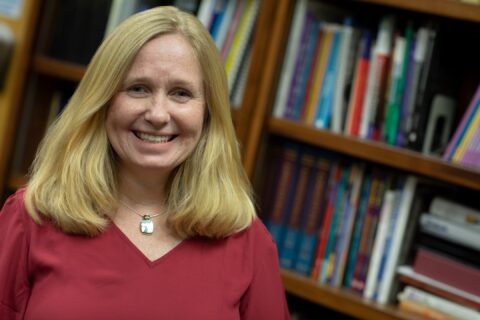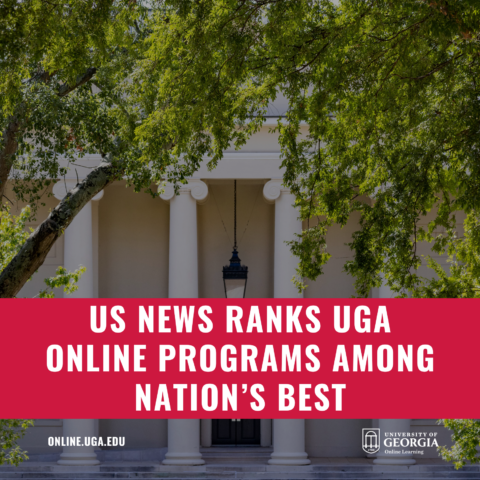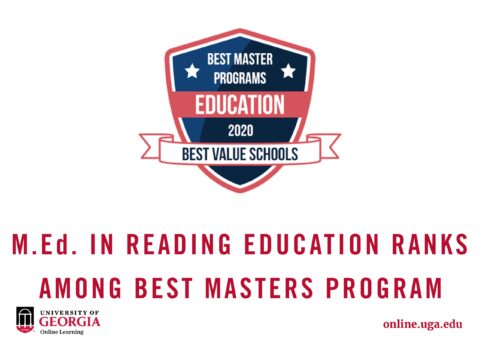Master of Education (M.Ed.) in Reading Education
Master of Education (M.Ed.) in Reading Education

As I teach teachers, I always remember that sharing my teaching successes, failures, and insights with them is crucial. This is why I like to present myself as their mentor, rather than their professor.
Clinical Professor
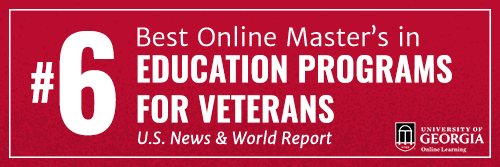

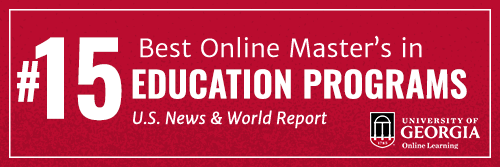
Overview
Designed for certified teachers and literacy education professionals, the Master of Education in Reading Education equips you to develop a curriculum that cultivates fluency, enhances comprehension, and encourages development in learners at all levels of literacy. This online reading and literacy master’s program is appropriate for teachers working with students from pre-kindergarten through grade twelve.
Offered through the Mary Frances Early College of Education, the University of Georgia’s online Master of Education in Reading Education with an emphasis on new and digital literacies is designed to educate teachers in ways that advance their students as readers in the broadest sense from printed materials to digital multimedia environments. This online reading specialist degree program is offered by the Language and Literacy Education Department, whose faculty is recognized nationally and internationally for their teaching and research.
How Long Does It Take To Earn An Online Master of Education In Reading Education?
This 100% online Master of Education in Reading Education program is designed for part-time students. It can be completed in two years (six semesters) if students take two courses every semester. A minimum of 36 credit hours in a 12-course sequence is required, providing a strong core understanding of research-based literacy instruction, cultural and historical foundations, and research. This core is augmented by four specialization courses focused on new and digital literacies.
What Are The Benefits Of An Online Master of Education in Reading Education?
This online master’s degree in reading education provides a flexible and convenient way to earn a degree while still meeting the demands of your busy schedule.
By earning a master’s in reading and literacy you can change the trajectory of your career, pursue advancement in your current role, or continue on to doctoral studies.
What Can I Do With An Online Master of Education Reading Education?
Graduates of the online reading education master’s program learn to encourage literacy at all levels of the student experience and can gain employment with agencies in both public and private sectors.
Others, seeking a more entrepreneurial route, could choose to establish their own literacy-related tutoring service.
Why Choose UGA Online’s Master of Education In Reading Education?
As an online graduate of the University of Georgia, you become part of an extensive alumni network and a longstanding tradition of striving for excellence in every pursuit. For over two hundred years, we have been on a mission of leadership and service, and today, we are ranked #16 among the nation’s top public institutions by U.S. News & World Report, with our online education programs ranked #3 in the nation.
Online students are granted the same access to online resources, career services, library services, and technical support as all enrolled University of Georgia students to help ensure that you are equipped for success in every way.
Accreditations
The University of Georgia is accredited by the Southern Association of Colleges and Schools Commission on Colleges (SACSCOC) to award baccalaureate, master’s, specialist, and doctoral degrees. The University of Georgia also may offer credentials such as certificates and diplomas at approved degree levels. Questions about the accreditation of the University of Georgia may be directed in writing to the Southern Association of Colleges and Schools Commission on Colleges at 1866 Southern Lane, Decatur, GA 30033-4097, by calling (404) 679-4500, or by using information available on SACSCOC’s website (www.sacscoc.org).
Admissions
Credit and Transfer
Total Hours Required to Earn Degree: 36 (credit hours)
Maximum Hours Transferable into Program: 9 (transfer courses must align with courses in the program of study)
Online Master of Education In Reading Education Admission Requirements
Students applying to The University of Georgia must be accepted by the Graduate School. Persons holding a bachelor’s degree from any institution accredited by the proper regional accrediting association are eligible to apply for admission to the Graduate School.
Applications are evaluated holistically, and recommendations for admission are based on an applicant’s qualifications, letters of recommendation, statement of purpose, and how these match with faculty interests, and the online Master’s In Reading Education program’s capacity.
- A strong undergraduate GPA with the usual acceptance being 3.0 or higher.
- Two or more years of teaching experience, although candidates with less than two years of experience will be considered.
Application Checklist
- Application – Submit the Graduate School Admissions online. Application fee: $75 Domestic / $100 International (waived for US veterans).
- Select Campus – Online
- Select Intended Program – MED, Reading Education (Language and Literacy Educ)[MED_READ_ONL]
- Select Area of Emphasis –
New and Digital Literacy 6-12
New and Digital Literacy P-5
- Exam Scores – International applicants must submit TOEFL or IELTS scores.
- Résumé or curriculum vita – Upload to the Graduate School application.
- Statement of Purpose – Submit a one-page statement of purpose online to the Graduate School. The statement of intent should clarify the candidate’s relevant background, interests, and goals in relation to the program.
- Transcripts – Upload unofficial transcripts from all institutions attended to the Graduate School application. Send official transcripts after you are offered admission.
- Letters of Recommendation – Submit three letters of recommendation online to graduate school. Letters should be from individuals who can evaluate the applicant’s scholarly ability and potential for success in a graduate program. The application will prompt your recommenders to submit their letters electronically.
Application Deadlines
Domestic Applicants
- Fall: June 30
- Spring: November 15
- Summer: April 1
International Applicants
- Fall: April 15
- Spring: October 15
- Summer: February 15
Cost
Tuition & Fees
Tuition rates and student fees may change each year.
Based on the 2024-25 credit-hour cost, a person who had completed this program at the recommended pace would have paid $23,220 in tuition. Reference this sheet to identify the current credit hour rate for your program of interest.
Please use the Estimated Cost Calculator on the Bursar’s Office website to calculate one academic (Fall/Spring) year’s tuition.
This program is an E-Rate program, so choose “yes” for the E-Rate line item within the calculator.
Fees for those students enrolled in exclusively online programs are $422 per semester.
Potential additional costs include:
- Textbooks
- Exam proctoring fees
- Technology upgrades
The complete cost of attendance can be found at https://osfa.uga.edu/costs/.
Financial Aid
Visit the Office of Student Financial Aid for information about financial assistance.
Corporate Assistance
Consult your employer about the availability of tuition reimbursement or tuition assistance programs.
Military Assistance
Active-duty military, veterans, and military families should visit Veterans Educational Benefits to take full advantage of available financial assistance and educational benefits.
University System of Georgia Tuition Assistance Program (TAP)
The purpose of TAP is to foster the professional growth and development of eligible employees. For more information, see Tuition Assistance (refer to the Distance Learning section).
Curriculum
Online Master of Education In Reading Education Course Sequence
Students interested in an endorsement should review the endorsement course sequence to ensure that electives correspond with the requirements for their state.
Up to two specialization or elective courses can be substituted upon consultation and agreement with your advisor.
Core Courses (6 credit hours)
LLED 6010e Survey of Reading Instruction Pre-K through Grade 12 – Principles and practices in preschool through secondary reading instruction. An overview of the methods, principles, and practices of teaching reading. This is a reading endorsement course.
LLED 6020e Practicum in Reading Instruction and Assessment (Clinic) – Formal and informal assessments, instructional procedures, and materials for children experiencing reading difficulties. This is a reading endorsement course. Tutoring is a requirement.
Specialization Courses (9 credit hours)
LLED 7110e Integrating Digital Resources in the Literacy Classroom – Integration of computers into instruction to enhance literacy in elementary through secondary schools.
LLED 7910e New Literacies – This course provides an overview of the ambiguities and tensions created by a current move from the long established autonomous model of “reading” to the “New Literacy Studies” (NLS). It also addresses the implications of NLS for teaching students to comprehend a wide range of texts.
LLED 8330e Popular Culture in Literacy Classrooms K-12 – Examination of how schools and institutions of higher education should respond to popular culture especially in terms of literacy teaching and learning.
Electives (18 credit hours)
LLED 6420e Literacy Development and Instruction in Early Childhood – Emergent literacy development of preschool through grade three children; theory and research relevant to instructional approaches and practice. This is a reading endorsement course for elementary teachers.
LLED 6060e Content Area Literacies – Theory and instructional strategies for enhancing reading, writing, speaking, and listening across various subjects in the school curriculum for grades 4-12. This is a reading endorsement course for middle and high school teachers.
LLED 7070e Research Methods in Language Education – Research methods appropriate for studying language teaching and learning.
LLED 7930e, Culture and Literacy Classrooms – This course explores the ways culture transacts with teaching and learning in literacy classrooms.
LLED 7045e Global Awareness through International Children’s Literature – This special topics course aims to enable doctoral and master’s students to explore international children’s texts and the scholarship around them.
LLED 7325e Social Cultural Perspectives of Dyslexia- Explores the historical and current understandings of dyslexia and the resulting impact on assessment, instruction, and policy.
LLED 7335e Reading Picturebooks – Critical investigations of the power and potential of picture books as literary, artistic, and social texts in the lives of children and adults.
Capstone course (3 credit hours)
LLED 7940e Electronic Assessment in Literacy Classrooms – Explores why and how to effectively use print-based and technological approaches to integrating electronic portfolio assessment into the literacy K-12 curriculum.
FINAL EXAMINATION – The examination format is a multi-modal composition with the student’s choice of online or software platform (e.g., wiki, blog, presentation), design (e.g., graphics, images, audio, video). Download the M.Ed. Reading Education Final Exam Policy for additional details.
Licensure
This program is designed to enable you to practice in a licensed profession through initial certification in the state of Georgia. If you apply to this program from a state outside of Georgia with the plan to work in Georgia, you will be given the opportunity to attest to that intention when you apply.
An enrollment coach will contact you to determine your circumstances and ensure that this program will be effective for you.
Additional information and disclosures regarding state licensure for professional practice in this field can be found at the UGA Licensure Disclosure Portal.
Faculty
News & Events
US News Ranks UGA Online Programs Among Nation’s Best
February 7, 2024U.S. News & World Report released their 2024 Best Online Programs rankings with several of the University of Georgia online programs in the top 10.
From the U.S. to South Korea: Reading education student focuses on teacher collaboration
February 24, 2021In 2016, Angie Vernau, a teacher for over 20 years, moved with her family to Pyeongtaek, South Korea. Vernau’s husband was an active-duty soldier in the U.S. Army when they first married and lived in Augusta, Georgia. Vernau is a mother of three children and currently works as an…
UGA’s Master of Education in Reading Education ranked among Best Master’s Programs
January 22, 2021Best Value Schools has ranked the University of Georgia’s Mary Frances Early College of Education 12th in their Best Master’s in Education Degree Programs for its Master of Education in Reading Education for 2020. The Master of Education in Reading Education has a focus on new and…
Testimonials
“The classes are designed in such a way that you still engage with your peers in discussion on readings, and the projects are meaningful and often applicable to your classroom. I have gotten so many teaching ideas this year from classmates and from assigned readings.”
Abigail Letts, ’17
“I was looking for an education to help me succeed in the classroom and that’s where UGA Online came in. Several of my family members have attended UGA and I knew UGA was an outstanding place to learn, be academically challenged, and watch football! Researching the Masters’ programs, I saw UGA offered interesting and diverse courses that addressed topics I was interested in.”
Mary Pat, ’18
“Many of the people in my class are teachers, and we all teach different programs – and some teach in other states – so I get a chance to hear from people near and far. That’s what really drew me to the online program. I get the flexibility of communication and the rigor UGA is known for. This has exceeded my expectations regarding what I expected to learn in my master’s program.”
Maima Chea, ’14
Contact Information
Contact us using the request for information form or call 706-452-7936.



